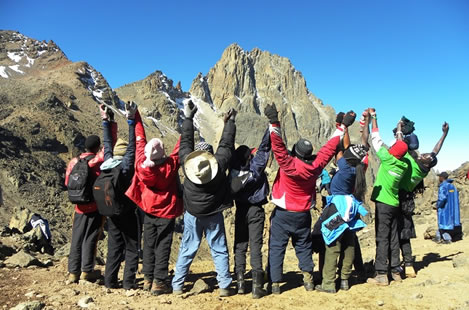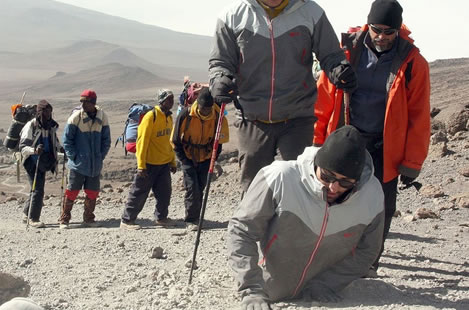Jan. 2002 Proverb: ” Where there is a will there is a way.” – Shona (Zimbabwe)
January, 2002
Far is where there is nothing, where something is that you will struggle to the death to reach. (Literal English translation)
Where there is a will there is a way. (Closest English equivalent proverb)

Shona (Zimbabwe) Proverb
Background, Explanation, Meaning and Everyday Use
The nothing and something connoted by the proverb is “value;” so far as there is nothing of value to the individual then such a thing remains unsought for, far out of reach. On the other hand, where an outcome is valued then all means and effort at the disposal of the individual will be marshaled to achieve it, thus nullifying the common understanding of “far.” The one aiming for the valued goal will expend effort even to death to reach it.
Traditionally the Shona people in Zimbabwe used several variations of this proverb such as:
- Kure ndokuna mai, kunemukadzi unofa waswika. Far is where mother is; where there is the woman you love you will expend all effort, even to death, to get there. (Literal English translation)
- Kure kwegava ndokusina mukubvu.It is far for the jackal where there is no mukubvu fruit tree. (Literal English translation)
Through observing the jackal the Shona people established hubvu, the fruit of the mukubvu tree, as the animal’s favorite fruit. What the variations illustrate is that values differ from situation to situation: for a man the love for his wife or girlfriend surpasses that for his mother, for the jackal it is love for the hubvu fruit. It is the sought after goals that determine the time and effort to be expended and also one’s priorities.
Biblical Parallels
In the book of Exodus Moses valued, through a vision from God, to lead his people to a Promised Land where they would learn to live by God’s commandments that had been revealed to him on Mt. Sinai. Moses, though not fully endowed with verbal abilities due to his stutter, was nevertheless able to live the true meaning of the proverb. To Moses “far” was where there was no Promised Land and because he believed, the 40 years spent in the wilderness were all part of the necessary effort and time required to reach there. Moses followed the proverb to the letter to the extent that he died before reaching the Promised Land.
 Contemporary Use and Religious Application
Contemporary Use and Religious Application
This proverb applies to motivation, the desire to accomplish something of value for oneself and/or for the people one loves. When one really values something to the point of cherishing it then all time and effort will be expended to its realization, even to death if necessary.
It is during times of resignation, despair and despondency in one’s quest that remembering this proverb is a therapeutic tonic. One seeking to live a religious life in a world enmeshed in so much hunger, disease, hate and murder can also find solace in this proverb. One seeking to live the “Jesus way” in the midst of chaos, by loving God with all one’s soul and strength yet equally loving one’s neighbour as one’s self, could also find solace in the proverb. It is not far to God’s love, if only we could perceive this with a “never say far” attitude as urged by the proverb. The proverb equally applies to the everyday goals we determine for ourselves, urging us to simply desire strongly and expend the necessary time and effort to accomplish.
Simon Munyaradzi M’zungu
Gold Coast, Queensland, Australia
E-Mail: mzungu@ace-net.com.au
